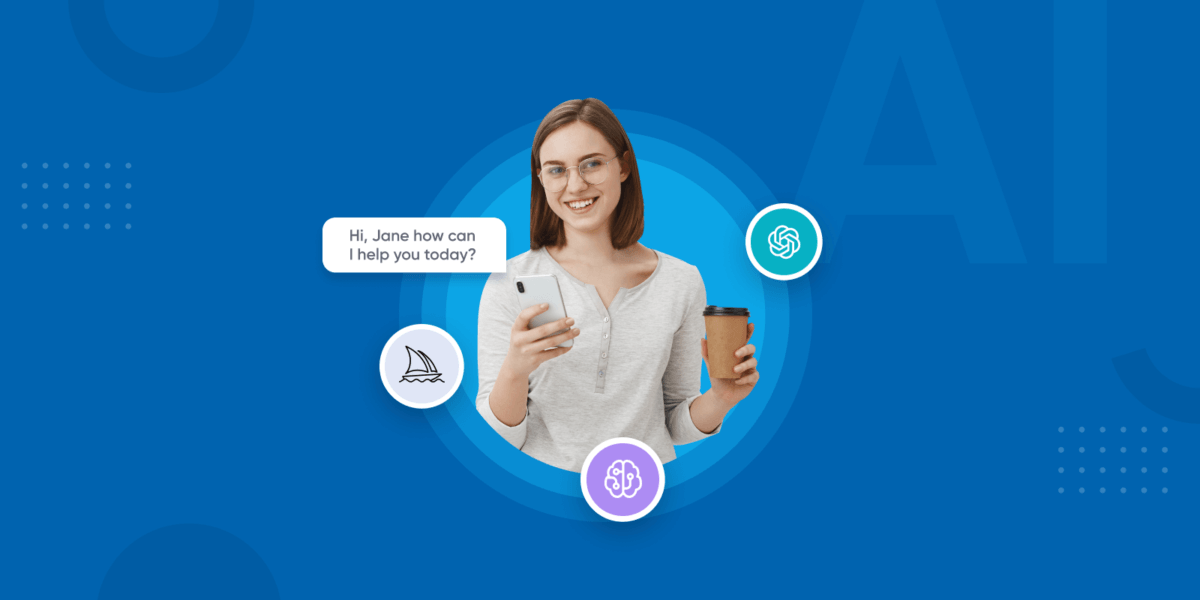How Generative AI is Transforming Customer Support?
- October 29th, 2024 / 4 Mins read
-
Namrata Narsinghani

How Generative AI is Transforming Customer Support?
- October 29th, 2024 / 4 Mins read
-
Namrata Narsinghani
In 2022, Open AI’s ChatGPT, a language model blew minds with its ability to generate human-quality text based on simple prompts. This marked a turning point in the evolution of artificial intelligence, showcasing its immense potential to revolutionise industries, including customer support.
For businesses striving to deliver exceptional customer experiences, generative AI for customer service offers a game-changing solution. Its advanced capabilities enabled automated, personalised, and responsive interactions, transforming how companies connect with their customers.
The blog will delve into the exciting world of generative AI for customer support. We’ll explore its benefits, use cases across various industries, and how it’s shaping the future of customer service.
What is Generative AI in Customer Support?
Generative AI (commonly known as Gen-AI) in customer support is a transformative approach that leverages artificial intelligence to enhance customer interactions.
By analysing vast datasets, it can generate real-time, personalised, and contextually relevant content, tailored to each customer’s needs.
This ability to create new content and responses not explicitly programmed allows generative AI for customer support to understand customer preferences better and provide more effective support.
As a result, it improves the quality of customer interactions by delivering customised marketing materials, product recommendations, and support responses that resonate with each customer’s unique requirements.
Benefits of Implementing Generative AI in Customer Service
There are numerous benefits of implementing generative AI for customer service. Let’s discuss some of them.
1. Reduce Resolution Time
Customer satisfaction is significantly influenced by the speed and accuracy of query resolution. Generative AI for customer experience, with its access to your technical content, can dramatically improve response times.
By instantly scanning and analysing large datasets from precisely retrieved documentation, it can extract relevant information and generate clear, concise responses. This automation allows your team to handle tickets more efficiently, reducing overall resolution time.
2. 24/7 Consistent Support
Generative AI chatbots, self-service portals, and knowledge bases offer a solution to the challenge of providing round-the-clock real-time support without excessive costs.
These AI-driven tools enable customers to interact anytime, regardless of their time zone. Hence, providing immediate and comprehensive assistance. By meeting and exceeding customer expectations in this way, businesses can gain a competitive edge in the digital age.
3. Multi-lingual support
A strong international brand presence is crucial for sales success. However, failing to provide customer support in their preferred language can hinder growth. This is where generative AI as a service becomes invaluable.
By processing your existing knowledge base content and responding to users in their chosen language, GenAI eliminates the need for pre-translated documentation. This on-the-fly translation ensures a seamless experience across all platforms, from FAQs and knowledge bases to GenAI chatbots and team emails.
4. Enhanced Personalisation
Allowing GenAI access to your customer database can significantly enhance customer support. By analysing customer demographics and purchase history, AI can tailor interactions more precisely.
This allows for customised help experiences, relevant product suggestions, personalised discounts and offers, and suggestions for add-ons or upgrades based on recent purchases. Ultimately, this personalised approach helps each customer feel valued and understood.
5. Reduce Support Cost
According to the Society for Human Resource Management (SHRM), training a new hire can cost up to $4,129. This figure can skyrocket to $10,000-$20,000 for support roles, factoring in 1:1 coaching, courses, and resource updates.
Despite these significant investments in support teams, attrition rates remain alarmingly high. Cresta insights report a peak of 87.6%.
In contrast, OpenAI’s ChatGPT offers a cost-effective alternative.
Semi-analysis projects that a single ChatGPT response costs just $0.36, a figure likely to decrease with future model advancements. This suggests a potential solution to the high costs and attrition rates associated with traditional human support.
How to Implement GenAI in Customer Service?
Implementing GenAI requires aligning AI with your business objectives, ensuring high data quality, and maintaining transparency and accountability. Here’s how you can implement GenAI while keeping these factors in mind.
1. Identify your Goals
First and foremost, understand your ‘Why.’ Identify the right AI use cases to enhance your existing customer support operations.
For instance,
- Customer satisfaction
- Response times
- Cost reduction
- Multilingual support
- Knowledge management
- Self-service options
Make sure your objectives are clear and measurable. This will help you better evaluate success.
2. Access Customer Service Needs and Readiness
Evaluate your current customer service operations:
- Analyse existing metrics: Assess key performance indicators like response time, Customer Satisfaction (CSAT), and Net Promoter Score (NPS) to identify areas for improvement.
- Review customer interaction data: Examine chat logs, emails, and call transcripts to understand the quality of customer interactions and identify recurring issues or trends.
- Ensure data quality and organisation: Verify that the collected data is relevant, accurate, and well-structured to effectively train your AI model.
Assess team readiness and technical limitations:
- Evaluate team skills: Determine if your team possesses the necessary skills and expertise to implement and manage generative AI for customer support.
- Identify technical requirements: Assess your current infrastructure and identify any necessary upgrades or additional resources needed to deploy and support AI-powered customer service solutions.
These steps can effectively evaluate your current customer service processes and identify opportunities to leverage generative AI to enhance customer experiences and improve operational efficiency.
3. Choose the Right Tool
Choosing the right GenAI tool for customer support is a critical decision that should align with both your business needs and budget. The solution should be scalable to accommodate future growth.
To ensure seamless integration, check how well the AI integrates with your existing systems, such as CRM, analytics, and consent management tools. Additionally, the tool should offer an intuitive interface for ease of use.
Therefore, to make an informed decision, review your competitors’ experiences, assess the vendor’s credibility, explore past success stories, or consult industry experts for guidance.
4. Train the modal
To ensure that AI effectively handles customer interactions, proper training is essential.
Define the scope: Clearly outline the types of inquiries the AI will handle. This will help focus the training data and evaluation.
Gather relevant data: Collect a diverse dataset of customer interactions, including previous conversations, support tickets, and chat logs.
Create and test use cases: Develop scenarios that represent common customer inquiries, issues, and journeys. Evaluate the AI’s responses to these scenarios and adjust the training data or parameters as needed.
5. Monitor and evaluate
To monitor and evaluate performance, consistently track improvements over time. Implementing a feedback mechanism is an effective way to gauge progress. So consider integrating feedback options within the AI interface.
Analyse the feedback to identify areas for improvement.
Additionally, gather input from human agents working alongside the AI to gain insights into its performance.
Lastly, regularly update the AI’s training data with new information to enhance its accuracy and relevance.
6. Iterate and Improve
Continuously monitor and refine the AI system. Track all changes, updates, and improvements to ensure ongoing development. Schedule regular review sessions to assess progress and identify areas for further enhancement.
This iterative process is essential for maintaining the AI system’s effectiveness and keeping it aligned with evolving needs.
Use Cases Of Generative AI for Various Industries
As AI becomes increasingly accurate, sophisticated, and reliable, various industries are adopting it to meet their specific needs. Let’s explore some of its use cases across different sectors.
1. Healthcare
Generative AI is reshaping the healthcare landscape by automating processes, improving diagnosis accuracy, and personalising treatments.
- Appointment Management: Generative AI for customer support streamlines patient’s appointments by automating scheduling and rescheduling, and optimising time slot availability.
- Efficient Documentation: Real-time documentation and record-keeping reduce administrative burdens for healthcare professionals.
- Error-Free Billing: AI-powered billing accelerates claim processing while ensuring accuracy.
- Enhanced Patient Engagement: Gen-AI chatbots handle routine inquiries, appointment reminders, and follow-ups, improving patient experience.
Beyond operational efficiency, GenAI is driving advancements in medical research. Natural Language Processing (NLP) capabilities enable the interpretation and summarisation of complex medical literature, facilitating easier access to knowledge for researchers.
By empowering healthcare providers with more accurate, timely, and effective insights, GenAI is ultimately improving patient outcomes.
2. Finance
The adoption of generative AI in finance is rapidly expanding across various areas, including customer service, data analytics, fraud detection, algorithmic trading, and regulatory compliance.
GenAI reduces the time banks spend searching for and summarising information from internal documents. It allows employees to quickly comprehend content, such as contracts, policies, and regulatory filings.
In fraud detection, genAI complements traditional algorithms by analysing historical data to identify fraudulent patterns. It can generate synthetic anomalies by mimicking these patterns, which can then be used to enhance fraud detection algorithms, making them more effective at identifying new types of fraud.
Additionally, genAI processes vast amounts of customer data—such as transaction history, spending preferences, financial products, and savings goals—to provide personalised support tailored to individual needs.
3. Retail
GenAI offers several advantages in retail, enhancing personalised customer experiences, optimising inventory management, and refining marketing strategies. Here’s how:
- Customer Experience: GenAI can be programmed to enhance customer satisfaction at every touchpoint. It can efficiently track orders, update shipping details, handle reorders, or locate stores quickly.
With the growing preference for self-service, GenAI supports customers by directing them to relevant knowledge base articles, generating automated replies, or providing detailed answers via generative AI chatbots. - Inventory Management: By analysing data, GenAI can predict inventory needs, optimise stock levels, and reduce waste. This ensures that products are available when customers want them and helps manage supply chain logistics more effectively.
- Marketing Strategies: GenAI excels at understanding target markets by analysing vast amounts of text data from the internet, such as customer reviews, survey responses, and social media comments. This analysis reveals patterns and trends, enabling brands to tailor their marketing strategies to meet current consumer demands and preferences.
Automate Your Query Resolution with Verloop.io – Co-Pilot for Agents
In today’s fast-paced world, customers demand quick, personalised responses and immediate resolutions. Verloop.io, a leader in customer service automation, addresses these needs with its cutting-edge tool — Co-Pilot for Support.
Why Verloop.io for Customer Service Automation?
At the forefront of customer service technology, Verloop.io utilises generative AI to enhance the customer experience. Their Co-Pilot for Support isn’t just another tool; it represents a transformative approach to managing customer interactions with precision and efficiency. Here’s how Verloop.io sets the benchmark:
- Real-Time Assistance: Co-Pilot for Support equips agents with instant, context-aware responses, ensuring swift and accurate query resolution. The AI continuously learns from each interaction, progressively refining its support capabilities.
- Automation at Scale: Co-Pilot automates repetitive tasks such as refunds, returns, cancellations, and scheduling. This automation enables agents to concentrate on more complex issues that require human empathy and judgment.
- Generative AI-Driven Insights: The AI not only proposes ready-to-send messages but also generates valuable insights and predictive suggestions. This allows agents to provide personalised recommendations, identify upsell opportunities, and maintain compliance with ease.
- Enhanced Customer Satisfaction: By automating routine queries and speeding up response times, Verloop.io’s Co-Pilot for Support significantly improves customer satisfaction (CSAT) scores and reduces average handling time (AHT).
FAQs
1. What is GenAI for customer support?
GenAI in customer support refers to the use of advanced generative AI technologies to enhance customer interactions. It involves leveraging AI systems to create real-time, personalised, and contextually relevant content. This includes generating responses to customer inquiries, crafting customised marketing materials, and making product recommendations based on data-driven insights.
2. How does GenAI improve customer support?
GenAI enhances customer support by automating responses, tailoring scripts, and categorising conversations. This automation streamlines routine processes, enabling real-time, personalised assistance. By promptly addressing queries, GenAI reduces wait times and allows human agents to focus on more complex issues.
3. What is the role of human agents in a contact centre GenAI environment?
In a contact centre GenAI environment, human agents play a crucial role by handling more complex and nuanced queries, particularly those requiring empathy and emotional support. They collaborate with AI systems to provide a personalised and seamless experience, ultimately building meaningful relationships with customers.






